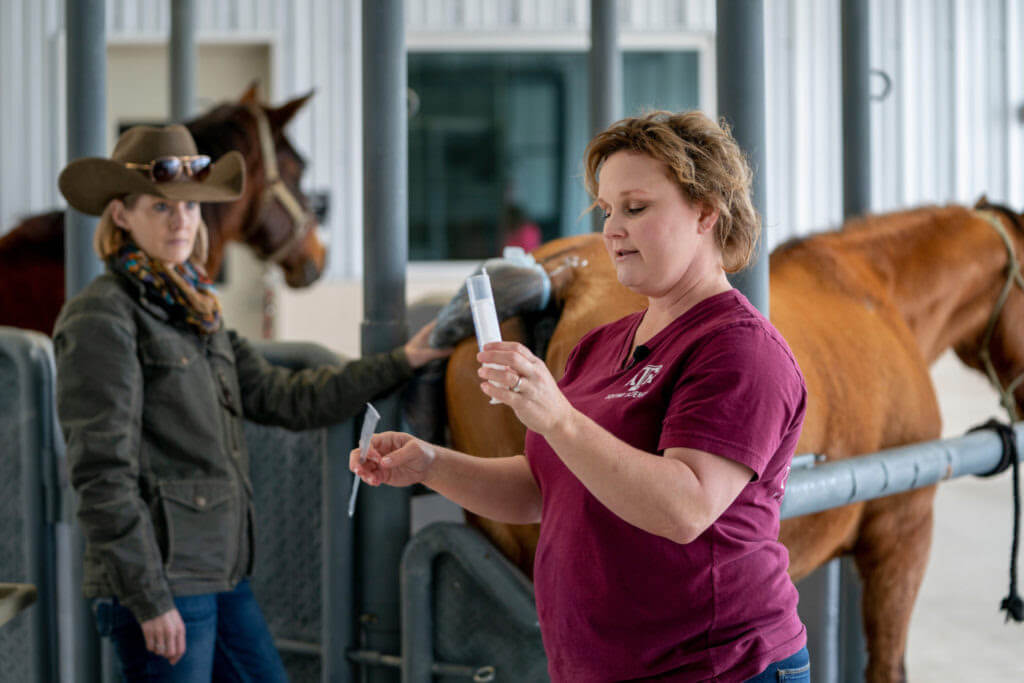Featured Photo Caption: Chelsie Huseman, Texas A&M AgriLife Extension Service horse specialist, and Krissy Schroeder, equine facility manager and breeding manager at Texas A&M, demonstrate the artificial insemination of a mare during the 2021 Equine Reproductive Management Short Course. (Texas A&M AgriLife photo by Laura McKenzie)
Online programs help ensure opportunities for greater participation
Texas is filled with horse enthusiasts, so it’s no wonder that each time the Texas A&M AgriLife Extension Service horse specialists Chelsie Huseman, Ph.D., and Jennifer Zoller, Ph.D., offer a live program on equine reproductive management, there’s a waiting list.
Because of the limited space allowed at live events, Zoller and Huseman, both in the College of Agriculture and Life Science’s Department of Animal Science, offer their unique educational opportunities online to reach more horse owners.
“The online course was really born out of necessity in 2021 when the COVID-19 pandemic forced us to halt in-person programming,” Huseman said. “We had such a positive response to the resource that we decided to make it a permanent online course for anyone in the world who wanted the information but couldn’t make a trip to Texas to get it.”
Equine reproductive management short course
The registration link was barely made when the Texas A&M Equine Reproductive Management Short Course, set more than five months away on Jan. 11-13, was already full. The course is designed for owners and breeding managers who want to learn the most efficient methods for ensuring the success of their breeding programs.
The three-day course at the Equine Nutrition and Reproduction Research Center includes classroom sessions on the anatomy and physiology of the mare and stallion, control of the estrous cycle, gestation and foaling, feeding the broodmare and young horse, and estrous cycle manipulation of mares.
It also offers hands-on laboratory activities daily, including semen collection and evaluation, estrous detection, artificial insemination, body condition scoring, perineal conformation evaluation of the mare, and foaling management. The course content includes a broad range of topics useful for horse owners in any segment of the breeding industry.
Building an online portfolio for horse care
The in-person reproductive management course is limited to 12 people, and the fee is $700. Huseman said because participation is limited, this course fills very rapidly. This year they are beginning a wait list.

However, with the online equivalent course, horse breeders across the state — and really the nation and world — seeking more information don’t have to wait for their turn to visit the Texas A&M campus. The online program topics include stallion reproductive management, mare reproductive management and a tour of the equine reproductive facility. Management techniques, including on-farm foaling kits, pregnancy checks and artificial lighting systems, are demonstrated for viewers.
The online course is offered for $300 at https://tx.ag/EquineReproShortCourse.
A natural extension of the reproductive management short course is the Mare and Foals Workshop, which is offered online. This course concentrates on the foaling process, including predicting and preparing for foal arrival, postpartum placental evaluation, and proper nutrition for pregnant mares and foals. It also covers developing a vaccination program for the broodmare and foal along with vaccination administration guidelines.
The course cost is $75 and is available at https://tx.ag/MareFoalWorkshop.
Huseman said she is also developing an online course on training the stallion to collect, which they hope to launch in early 2023.
“We’ve had a lot of requests from past attendees for information on how to train the stallion to collect,” she said.
During the annual in-person course, they have seasoned, well-trained stallions, Huseman said, so it’s not something they can readily demonstrate with participants.
“But with the help of industry partners and a few new, up-and-coming Texas A&M stallions, we have captured video footage of the progressive stages stallions go through to learn how to be collected on the phantom.”
About the equine experts
Huseman’s interest in equine reproductive management started when she studied embryo recovery in reproductively abnormal mares for her master’s thesis at West Texas A&M University in Canyon. Upon her arrival at Texas A&M, her interests expanded to the areas of skeletal adaptation to exercise and whole-body vibration.
She continues research in equine reproductive management, recently studying a new technology for semen analysis with an iPad. Utilizing her expertise in the subject matter, she has developed numerous programs, workshops and resources for Texans and beyond.
Zoller provides statewide leadership for planning, implementing, conducting and evaluating AgriLife Extension education programs in equine sciences. She provides leadership with the State 4-H Horse Show, Texas Horse Help mobile application and horse judging competitions across the state. Her research interests include energy balance, manipulating the body condition of the exercising horse to maximize nutrition programs, and the health benefits of participating in equine activities.
For more information on any of their educational programs, both online and in person, contact Huseman at chelsie.huseman@tamu.edu or Zoller at jennifer.zoller@tamu.edu or call 979-845-5264.

News from the horse industry. Sharing today’s information as it happens. The Colorado Horse Source is not responsible for the content of 3rd party submissions.

